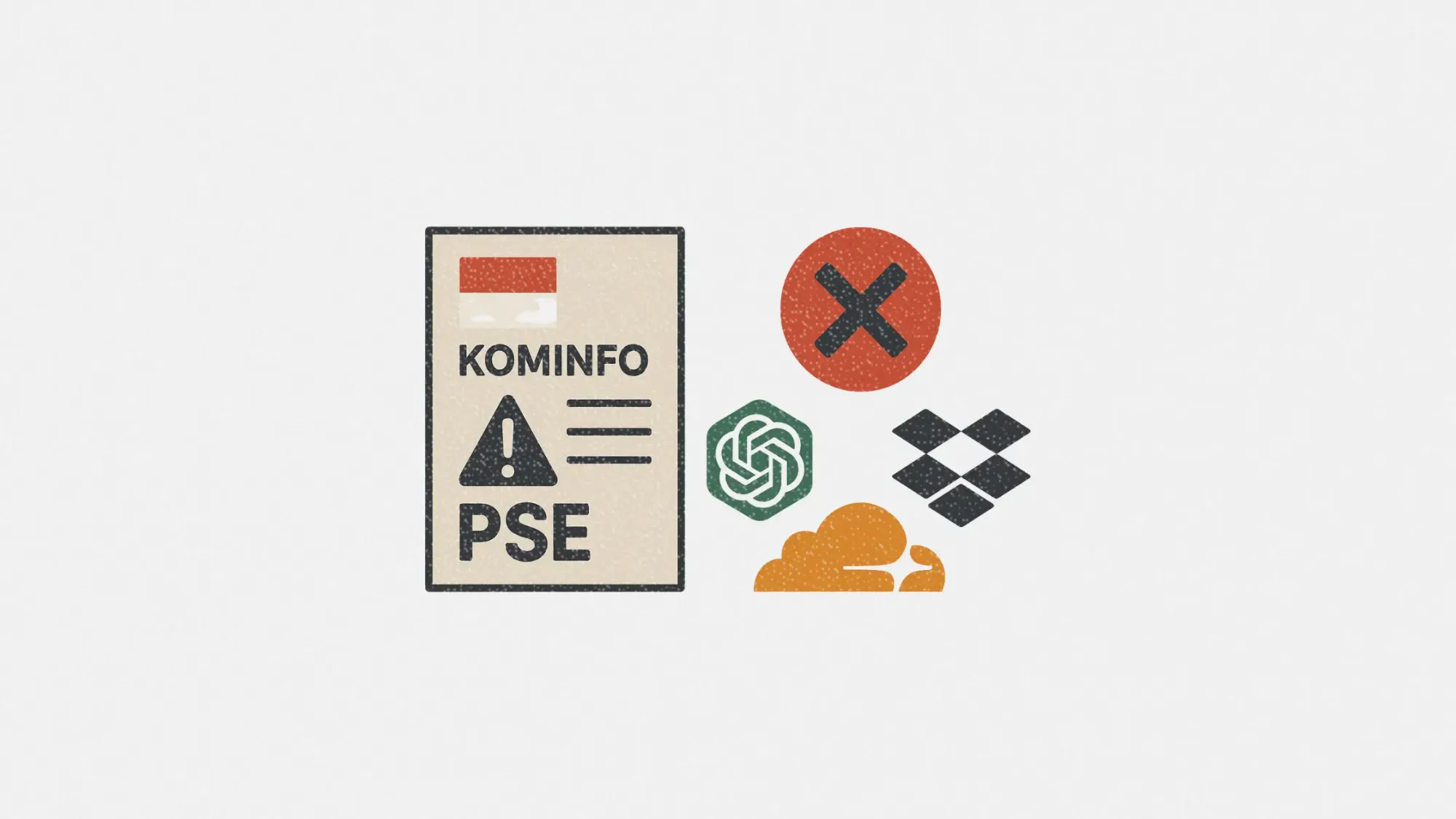Indonesia may block ChatGPT, Cloudflare, and others over PSE non-compliance
Indonesia’s Kominfo is stepping up PSE enforcement, and major tools like ChatGPT and Cloudflare are in the crosshairs

Indonesia is warning 25 digital services—including ChatGPT, Cloudflare, and Dropbox—that they risk being blocked if they don’t comply with local registration rules.
The country’s Ministry of Communication and Digital (Kominfo) is preparing to enforce its 2020 regulation requiring all foreign and domestic platforms to register as private Electronic System Providers (PSE) before operating in Indonesia.
This article explores the regulatory crackdown, who’s on the warning list, and what brands and marketers need to do if these services go dark.
Short on time?
Here’s a quick overview of the key sections:
- What’s happening with Kominfo and the PSE regulation?
- Who’s at risk of getting blocked?
- What marketers and tech teams should do now

What's happening with Kominfo and the PSE regulation?
The 2020 regulation, known formally as PM Kominfo No. 5 of 2020, mandates that all electronic system operators register through the Online Single Submission (OSS) portal before serving users in Indonesia. It applies to both local and international platforms, including software-as-a-service (SaaS) companies, cloud infrastructure providers, and consumer-facing apps.
Officials at Kominfo stated that letters have been sent to 25 companies, warning them to register or face administrative sanctions. These may include access restrictions or outright blocking.
While Kominfo says it’s willing to assist companies with the registration process, the ministry emphasized that compliance is not optional.
Who's at risk of getting blocked?
Some of the more prominent names on the warning list include:
- Cloudflare (Content Delivery Network and security provider)
- OpenAI’s ChatGPT (AI chatbot and API service)
- Dropbox (cloud storage)
- Duolingo (language learning)
- Wikimedia Foundation (including Wikipedia)
- Zoho (enterprise SaaS)
- Marriott and Accor (hospitality and booking services)
- Shutterstock (stock image provider)
These platforms serve millions of Indonesian users and are deeply embedded in enterprise tech stacks, content production workflows, and customer experience touchpoints.
What marketers and tech teams should do now
If you're using any of the 25 flagged services to reach, support, or serve users in Indonesia, this warning isn’t just regulatory noise. It’s a potential business disruption. Here’s what to do now:
1. Map your stack dependencies
Start by auditing your internal systems and marketing operations to identify whether you're using services like Cloudflare (CDN), Dropbox (storage), or ChatGPT (automation, content, or support). Don’t overlook indirect integrations through platforms like Zapier, CRM tools, or embedded widgets.
2. Prepare for CDN failover scenarios
A potential Cloudflare block could cripple performance for sites relying on it as the sole CDN in the region. Teams should explore multi-CDN strategies, with Fastly, Akamai, or regional CDNs as backup. Notably, Fastly claims sites migrating from Akamai see a 17% faster Largest Contentful Paint and a 57% faster Time to First Byte. Performance marketers should keep that in mind.
3. Plan around ChatGPT availability
If your workflows or customer support use OpenAI’s tools, consider fallback options. Since Kominfo has confirmed that paid services must register under PSE rules, unregistered API access could get restricted. SaaS teams building automation features on top of GPT APIs should monitor registration status and build contingency plans.
4. Watch out for content and API dependencies
Services like Wikimedia and Shutterstock feed into editorial, CMS, and search experiences. Marketers using AI-driven content tools should check if any rely on these APIs behind the scenes. A service disruption in Indonesia could break workflows or affect campaign timelines.
5. Stay ahead of compliance issues
Even if your brand is not directly affected, partners and vendors might be. That means digital and compliance teams should keep an eye on Kominfo updates and ensure vendors are registered. Brands operating in Southeast Asia’s largest digital market cannot afford blind spots.
Indonesia’s move is part of a broader global trend toward stricter platform regulation. But unlike some countries that focus on taxation or content, this is a hard line on legal operating status. With no clear timeline for enforcement but a clear warning sent, marketers, IT leads, and compliance officers should act now—not later.




